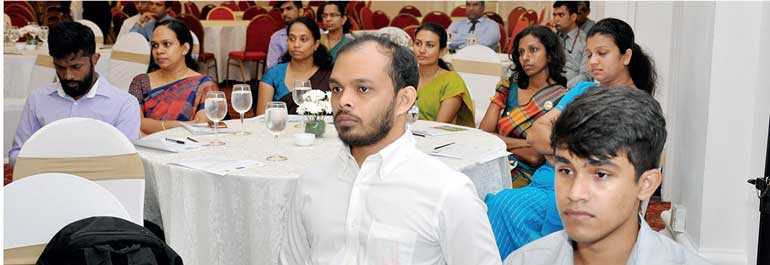Saturday Feb 14, 2026
Saturday Feb 14, 2026
Thursday, 5 September 2019 01:45 - - {{hitsCtrl.values.hits}}

By Madushka Balasuriya
Small and medium-sized enterprises (SMEs) will be the biggest beneficiaries if the Sri Lankan Government’s proposed reforms of its e-commerce infrastructure prove successful, a Government official claimed on Tuesday.
“We need to do more to move forward the e-commerce reform agenda for the benefits of the SME business community, who should be the ultimate beneficiary of this exercise,” stated Dr. Dayaratne Silva, the National Project Coordinator for EU-Sri Lanka trade-related assistance.
“The bigger companies have the abilities and resources to get around problems, be it e-commerce or otherwise. It is the smaller companies that often do not have the capabilities. With the proper management of e-commerce, with the right policy framework, e-commerce offers significant sales channels for SMEs. Which is in the end the focus area of this project.”
Dr. Silva, who was speaking during the opening session of the third National Public-Private Dialogue (PPD) on E-commerce Reforms in Sri Lanka in Colombo, also noted that a sound digital strategy was the most efficient way to merge trade and development agendas, which in turn would support SMEs.
“To support SMEs we today discuss two agendas – the development agenda and the trade agenda. I believe both should go hand in hand. If there is a disconnect between the two (development and trade agendas) a digital strategy is the best way to connect them. “E-commerce can act as the zipper to fasten both agendas together, but to do this a clear road map and thinking are required. This could be best achieved and facilitated in a dialogue of this nature involving all the relevant stakeholders – public sector, private sector, consumer organisations, etc.”
Organised by the Ministry of Digital Infrastructure and Information Technology (MDIIT) and the International Trade Centre (ITC), this PPD, set to take place 3 and 4 September, is aimed at building on two previous iterations of the event held over the last year and a half.
Reports stemming from past dialogues have identified several key areas that require reforms such as e-payments, logistics, data protection and privacy, consumer protection, cybersecurity, education and awareness.

“All these previous PPDs generated a rich debate and provided a wide range of recommendations as concrete outcomes. Equally at this workshop, we as organisers have attempted to present a substantive agenda for discussion covering very critical areas that are significantly important in advancing the country’s reform process to drive the e-commerce framework,” added Silva. Among the key objectives of this third PPD will be to analyse the progress already made in the areas where reforms have been identified; discuss the way forward in crafting legislative proposals that will update national laws; understand how reforms in each of these areas are linked, particularly with regard to the increasing use of e-commerce platforms; and provide an opportunity for the private sector to participate and become involved in the reform process.
This year’s dialogue will be will be facilitated by Dr. Michael Geist, an ITC expert with global experience in e-commerce and expertise in e-commerce law. Addressing the gathering, Dr. Geist spoke of the ‘pivotal’ nature of this year’s gathering, especially taking into account the number of international experts involved this time around. “This is the third but also the most important. In a sense this is almost a pivotal moment, having seen the growth and seen the interest and acceleration in e-commerce there is an opportunity here in Sri Lanka to continue along those lines,” stated Dr. Geist. “Our goal should be to up our game in the next two days, and enlist all these top international experts for additional input.”
Also addressing the session was Secretary Ministry of Digital Infrastructure and Information Technology M.C.L. Rodrigo, who touted the importance of such conversations, adding that they go hand in hand with the work the ministry is trying to accomplish.
“The Ministry, along with its two key organisations – ICTA and Sri Lanka CERT – are assisting in realising thrust areas of e-commerce through a myriad of activities including policies, strategies, regulations, human resource capacity development and ensuring the provision of required digital infrastructure.
“For example, the Draft National Digital Policy 2020-2025, which is still under review, has recognised the need for an Innovative Economy, with the focus on improved competitiveness, revenue and digital jobs.”
Alongside these targets, the ministry also has ambitious goals of achieving $ 5 billion in ICT export revenue by 2020 and ensuring over 10,000 companies are benefited in a digitally-enabled free trade zone. “This is directly related to the activities discussed here today. These inputs will be very helpful for my ministry in developing and helping related policy.
“If you can bring this knowledge and skills to the village and grassroots level where we have 74% of our population it will be very facilitating.”
Pix by Lasantha Kumara